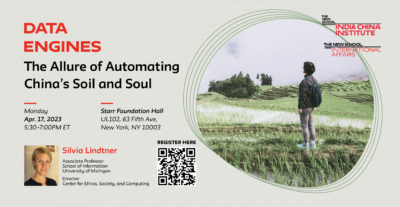Digital Worlds and Data Politics
India and China, in many respects, are at the helm of showcasing how digital technologies and data politics are co-producing novel forms of expertise, citizenship, and cultures. In both countries, governments, rather than large corporations, have spearheaded large digital initiatives. For instance, the Indian government’s Aadhaar, which covers more than 1.2 billion people, is the world’s largest biometric identification system that seeks to reconfigure the provision of and access to social welfare services, financial services, and much more. Aadhaar’s influence has spilled far beyond India’s borders, having been enthusiastically endorsed by international development agencies as a model for other governments. An example from China is its plans for a ‘Digital Silk Road’ as an integral part of its ambitious Belt and Road Initiative that aims to integrate the country with large swathes of Asia, Africa, and Europe. The Digital Silk Road includes building physical infrastructure, research centres, and smart city and e-commerce projects across countries. Crucially, it aims to collect data of hundreds of millions of people, with data being subject to both old logics akin to that of natural resources, and new ones that braid together strands of governance, security, and commerce.
This research cluster seeks to examine how the politics of data and digital initiatives are unfolding in China and India, and larger regions that they are part of. At the forefront are questions of knowledge production and expertise. Whose data are being collected; who will collect and own the data; what kind of knowledge will be produced using these data? Also germane are questions of citizenship and governance, cultural production and public spheres, and emerging political economies of data. A core intent of the cluster is to facilitate the conceptualization of new frameworks within which to discuss digital worlds. Much of the debate has been dominated by undoubtedly important concerns about privacy and increasing monopolies of large technology companies. And yet these issues do not necessarily capture the anxieties and aspirations that animate other parts of the world. Studying digital and data politics in India and China allows us to bring to the forefront other kinds of questions such as around equity and distribution; minority rights and political resistance; new platforms for public reasoning and cultural production; economic competition and national competitiveness. Instead of embracing a “digital universalism” that encapsulates and assimilates diverse contexts, this cluster hopes to provide space for new conceptual framings and imaginaries for digital and data politics.

